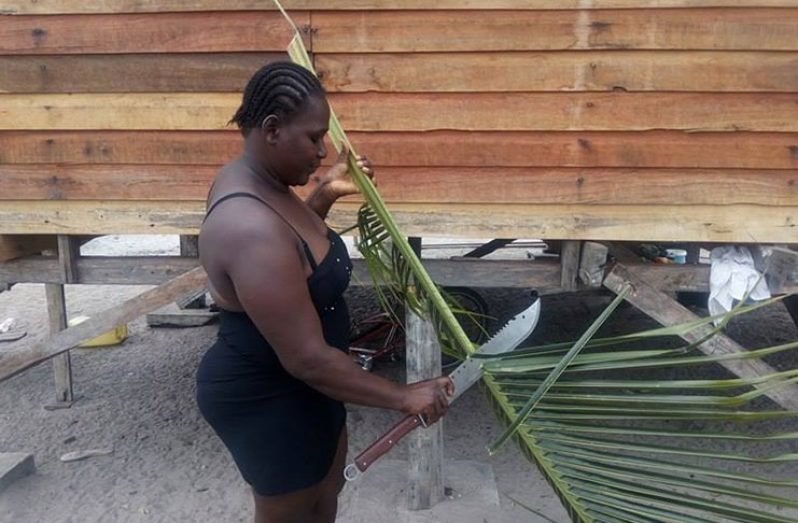SHE sits in her wooden two-bedroom shack, staring at the six little ones before her to feed, clothe and send to school.
As she stares, a little spunk steals up her spine, and as they stare back at her, eyes alight with hope, her strength mounts and she gets up.
The innate desire within her as a mother to provide for her young, no matter the circumstances, led her feet to the coconut tree.
The humble coconut has, for decades, been popular for its plethora of uses and health benefits.
For Rhonda Blair, the coconut tree has been providing for her family ever since she was a little girl, and now that she is a grown woman, it continues to play a key role in her life and the lives of her young children.
Rhonda has acquired the skill of picking the green branches of the coconut tree and stripping them, so as to expose the pointers within the leaves. Leaf by leaf she strips, day by day, until she gets enough spines to bundle into what Guyanese call a “pointer broom”.
When she’s done, she makes her way around the community, seeking out customers to buy her brooms.
The mining town of Linden is known for its proliferation of dust because of bauxite mining, so her brooms are always in demand. As is the old saying, “New brooms sweep clean”, and so, after months of using the same old pointer broom, a housewife soon tosses it aside. And Rhonda is always there to her rescue.
‘ME AND MEH SON’
Speaking with the Guyana Chronicle on Wednesday Rhonda told of her journey to the coconut farms aback Amelia’s Ward, commonly known as ‘Back Road’, to access the branches.
“My son does climb the tree,” she said. We does go over the river with a boat, and on the farm, we does cut the branch. I does sit and strip them; I don’t really take long because I get accustom to it. I have been doing it since I was a little girl.”
She averages taking about an hour to an hour-and-a-half to complete the stripping and bundling process to make two brooms, and would try to do at least 10 or more per week, if she receives the orders from customers.
She sells one broom for $500, and if she has about 10, then she’s likely to make about $5000 per week. And that, she said, really assist with the needs of her young children.
“Yes! I does enjoy doing it; it does be fun for me! We does also use the coconut to make oil sometimes, but not to sell; just for home,” she said jokingly.
Besides selling brooms, Rhonda also does odd jobs around the neighbourhood to augment the selling of the pointer brooms.
“Sometimes I does find it difficult; that is the reason I does do other jobs,” Rhonda said, adding:
“If I know people want their yard clean and suh, I would go and do it; I does weed yard and also I does clean house.”
‘BACK-ROAD’ LIVING
As to what life’s like living on the ‘Back Road’, which is a squatting area, Rhonda highlighted the many challenges of living without such basic amenities as running water and access roads.
“Every day, twice a day, we does go at the spring and bathe, because we don’t have water,” she said.
“We does have to depend on rain; if not, we have to fetch from the spring.”
She gets whatever little electricity she needs from a solar panel that was gifted to her by government officials during the election campaign.
But with her small, wooden home not being as secure as she’d like it be, she sometimes lives in fear, as it was only recently that her neighbour’s house was broken into.
Somehow, she feels a whole lot safer when her teenage sons are at home. Her eldest child is 17, while her youngest is two.
Despite having to raise six children on her own and finding it difficult to make ends meet, Rhonda is very humble and content.
She quite likes the simple life. “I like behind here; it is nice and quiet and breezy; everyone is happy,” she said, as there’s not a day that she or her children go hungry.
She doesn’t encourage them to stay away from school either, because, as she says, “As long as there’s the coconut tree, there’s always hope for another day.”
Making an honest living –from the humble coconut tree
SHARE THIS ARTICLE :
Facebook
Twitter
WhatsApp




.png)









